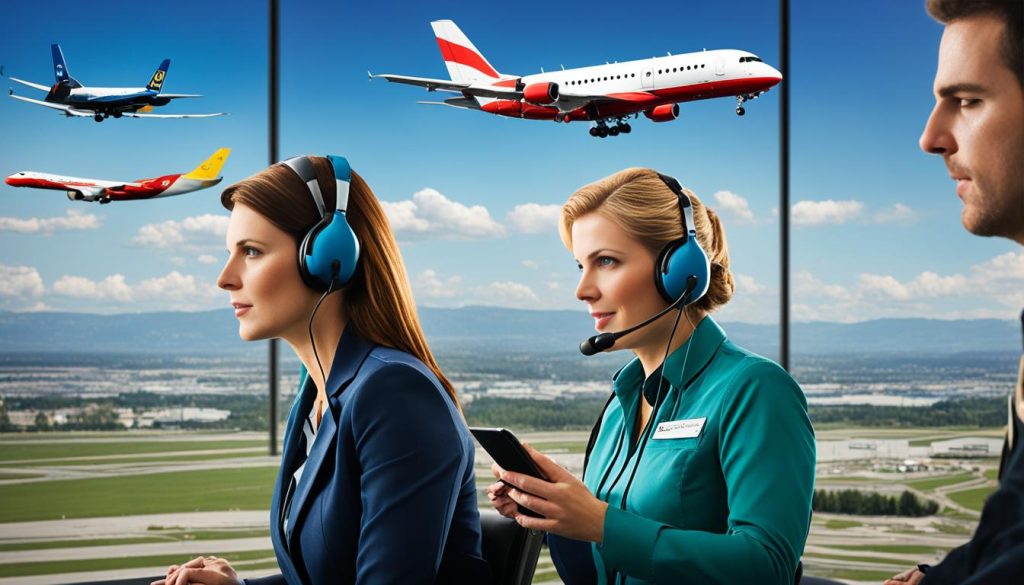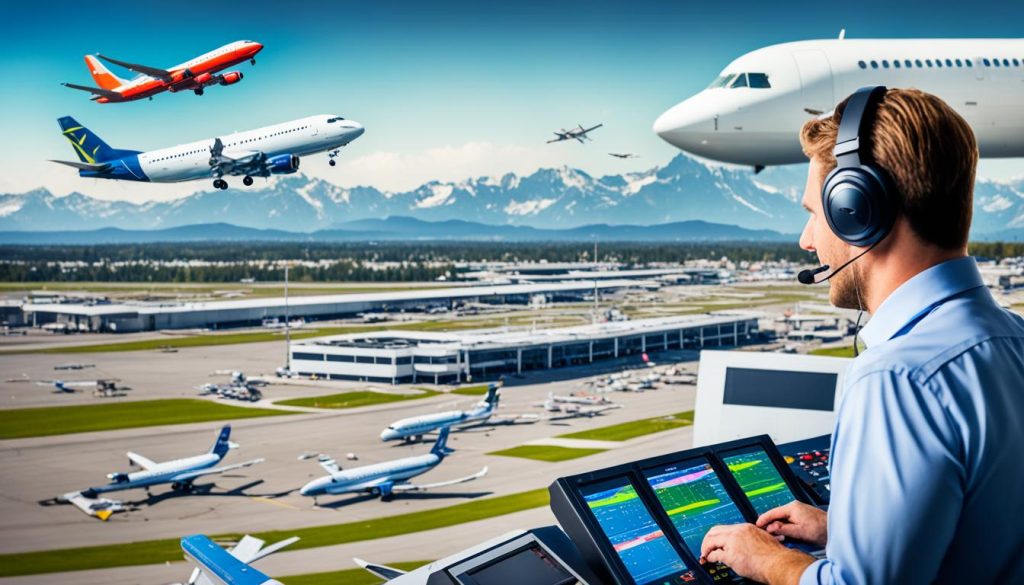Air travel has become an integral part of our modern world, connecting people and places like never before. Behind the scenes of every flight, there are dedicated professionals ensuring safe and efficient operations – air traffic controllers. These unsung heroes work tirelessly to manage the flow of air traffic, ensuring that planes take off, land, and navigate the skies without any incidents. But have you ever wondered what kind of compensation these professionals receive? In this article, we will explore the air traffic controller salary in Canada, providing you with an in-depth earnings guide. So, if you’re curious about air traffic control income, flight controller wages, or the ATC salary in Canada, keep reading to find out more!
Introduction to Air Traffic Controller Career
Air traffic controllers play a crucial role in ensuring the safety and efficiency of air travel. These professionals are responsible for monitoring and directing the movement of aircraft, both in the air and on the ground, to maintain safe separation between flights. Their primary duties involve communicating with pilots, issuing clearances and instructions, and coordinating the flow of air traffic to prevent collisions and delays.
Overview of the Role and Responsibilities
Air traffic controllers are the guardians of the skies, tasked with the vital responsibility of maintaining the smooth and safe operation of aviation. Their daily duties encompass a wide range of activities, including:
- Monitoring and tracking the position of aircraft to ensure safe separation
- Communicating with pilots, providing them with instructions and clearances
- Coordinating the take-off and landing of aircraft to optimize the flow of air traffic
- Responding to and managing emergency situations, such as diversions or equipment malfunctions
- Analyzing weather conditions and their impact on flight operations
- Collaborating with other air traffic control personnel and aviation authorities
Importance of Air Traffic Controllers in Aviation Safety
The role of air traffic controllers is paramount in ensuring the safety and security of air travel. Their actions directly impact the well-being of passengers, crews, and the general public. By effectively managing the flow of aircraft, air traffic controllers prevent collisions and reduce the risk of accidents, contributing to the overall safety and reliability of the aviation industry.
Moreover, air traffic controllers play a crucial role in optimizing the efficiency of air travel, minimizing delays, and enhancing the overall passenger experience. Their expertise and vigilance are essential in maintaining the integrity of the air transportation system, which is a vital component of modern society and the global economy.

Educational and Training Requirements
To become an air traffic controller in Canada, individuals must meet specific eligibility criteria and undergo a comprehensive training program. The process typically starts with meeting the basic requirements set by NAV CANADA, the country’s air navigation service provider. This includes being a Canadian citizen or permanent resident, having a high school diploma, and demonstrating proficiency in English and/or French, depending on the region.
1. Eligibility Criteria for NAV CANADA Training
Successful applicants must then undergo a multistep selection process, which may include cognitive tests, skills assessments, and interviews. The requirements for NAV CANADA’s air traffic controller training program are as follows:
- Canadian citizenship or permanent residency
- High school diploma or equivalent
- Proficiency in English and/or French
- Passing of cognitive and skills assessments
- Successful completion of interviews and other selection criteria
2. Training Process and Phases
Once selected, trainees embark on an intensive training program that combines classroom instruction, simulation exercises, and on-the-job training. This training process typically lasts between 10 to 15 months, depending on the specialization. The training program is designed to equip aspiring air traffic controllers with the necessary knowledge, skills, and practical experience to effectively manage air traffic safely and efficiently.
| Training Phase | Duration | Key Components |
|---|---|---|
| Classroom Instruction | 4-6 months |
|
| Simulation Exercises | 4-6 months |
|
| On-the-Job Training | 2-3 months |
|
Upon successful completion of the training program, air traffic controller trainees receive their certification and are ready to begin their careers, ensuring the safe and efficient movement of aircraft in Canadian airspace.

Air Traffic Controller Salary: Factors Affecting Earnings
The salary of air traffic controllers in Canada is influenced by various factors, including their level of experience and seniority, as well as the location and cost of living in the region where they are employed. Understanding these key factors can provide valuable insights into the air traffic controller pay scale and air traffic controller compensation in the country.
1. Experience and Seniority
Entry-level air traffic controllers typically start with a base salary, which then increases as they gain more experience and advance in their careers. According to the data, air traffic controller wages by experience can vary significantly:
- Early career air traffic controllers (1-4 years of experience) earn an average total compensation of C$98,572.
- Mid-career air traffic controllers (5-9 years of experience) earn an average total compensation of C$99,677.
- The highest salary recorded for an air traffic controller in Canada is CA$125,000 per year, while the lowest is CA$43,000 per year.
2. Location and Cost of Living
The factors affecting air traffic controller salary also include the location and cost of living in the region where they are employed. Air traffic controllers in higher cost-of-living areas typically earn higher salaries to offset the increased expenses. NAV CANADA, the country’s air navigation service provider, plays a key role in determining the pay scales and benefits for air traffic controllers across the country.
| Location | Average Salary Range |
|---|---|
| Canada (National Average) | C$44,000 to C$132,000 |
| United States | $60,000 to $200,000 |
| United Kingdom | £20,000 to over £100,000 |
| Germany | €110,000 to €135,000 |
| Spain | €180,000 |
| New Zealand | NZ$110,000 to NZ$245,000 |
| United Arab Emirates | $110,000 (with $4,000 bonus) |
| Qatar | $6,855 |
By understanding the key factors affecting air traffic controller salary, such as experience, seniority, location, and cost of living, individuals can gain a comprehensive understanding of the air traffic controller pay scale and air traffic controller compensation in Canada and other countries.

Average Salary Range for Air Traffic Controllers
The air traffic control profession in Canada offers a competitive salary range that can vary significantly based on factors such as experience, location, and specific job responsibilities. According to the latest data, the average air traffic controller salary in Canada typically falls within the range of $60,000 to $120,000 per year.
Entry-level air traffic controllers can expect to earn a base salary in the range of $60,000 to $70,000 annually. As they gain more experience and take on specialized roles or work in higher-volume airspaces, their air traffic control salary in Canada can increase to a range of $80,000 to $120,000 or more per year.
It’s important to note that these salary figures are estimates and can be influenced by various regional and industry-specific factors. For example, tower controller pay in Canada may differ from the compensation for flight service specialists based on the specific responsibilities and workloads associated with each role.
| Experience Level | Salary Range |
|---|---|
| Entry-level (Less than 1 year) | $60,000 – $70,000 |
| Early Career (1-4 years) | $70,000 – $85,000 |
| Experienced (5+ years) | $80,000 – $120,000+ |

The salary range for air traffic controllers in Canada can also be influenced by factors such as the type of air traffic control facility, the complexity of the airspace, and the demand for skilled professionals in specific regions. By considering these variables, aspiring air traffic controllers can gain a better understanding of the earning potential within this dynamic and essential field.
Career Advancement and Growth Opportunities
As an air traffic controller in Canada, you can look forward to ample opportunities for career advancement and professional growth. The air traffic control (ATC) field offers various specializations and promotion paths that can lead to increased responsibilities, enhanced skills, and higher earnings.
Specializations and Promotions
Air traffic controllers in Canada can specialize in different areas of air traffic control, such as tower control, approach control, or area control. These specializations often come with increased responsibilities and higher salaries. By acquiring additional training and expertise, controllers can transition between these specializations, broadening their skill set and advancing their careers.
Furthermore, experienced air traffic controllers can pursue management and supervisory roles, overseeing the operations of an entire airport or air traffic control facility. These leadership positions come with greater authority and may also be accompanied by higher compensation.
To advance as an air traffic controller, individuals must demonstrate a strong command of air traffic control principles, effective communication skills, and the ability to make critical decisions under pressure. Continuous training, ongoing professional development, and a commitment to excellence are crucial for career progression within this dynamic field.
| Specialization | Typical Responsibilities | Potential Salary Impact |
|---|---|---|
| Tower Control | Managing aircraft takeoffs, landings, and ground movements within the immediate vicinity of an airport | Potential for 5-10% increase in salary |
| Approach Control | Guiding aircraft during the approach and departure phases of flight, managing the airspace around an airport | Potential for 8-12% increase in salary |
| Area Control | Overseeing aircraft during the en-route phase of flight, managing the airspace between airports | Potential for 10-15% increase in salary |
| Supervisory/Management Roles | Overseeing the operations of an entire airport or air traffic control facility, managing a team of air traffic controllers | Potential for 15-20% increase in salary |
By leveraging their expertise and taking on specialized roles, air traffic controllers in Canada can unlock opportunities for career advancement and higher earnings. The ability to adapt to new challenges and continuously enhance one’s skills is key to success in this dynamic profession.
Benefits and Perks of Working as an Air Traffic Controller
Air traffic controllers in Canada enjoy a comprehensive benefits package that extends beyond just competitive salaries. From a robust pension plan to generous vacation time, the perks of this career path are numerous and enticing.
One of the standout benefits is the air traffic controller pension. This pension plan provides a stable and secure financial foundation for controllers as they progress through their careers and eventually retire. Additionally, the health and dental coverage offered to air traffic controllers ensures that they and their families have access to quality healthcare, further enhancing the overall compensation package.
The work schedule for air traffic controllers typically involves shift work, with shifts that can include evenings, weekends, and holidays. While this may seem like a drawback, it also means that controllers have the opportunity to enjoy more flexible time off, allowing for a better work-life balance.
Beyond the tangible benefits, air traffic controllers also have the chance to work in a dynamic, high-stakes environment that offers a sense of purpose and job satisfaction. The skills and expertise gained as an air traffic controller are highly valued in the aviation industry, providing opportunities for career mobility and advancement.
While the work can be demanding and stressful at times, the air traffic controller job perks make it a career worth considering for those with a passion for aviation and a strong aptitude for problem-solving and decision-making. The combination of competitive compensation, comprehensive benefits, and the opportunity to play a crucial role in ensuring aviation safety makes the air traffic controller profession an appealing choice for many in Canada.
Conclusion
In conclusion, the air traffic controller profession in Canada offers lucrative salaries and excellent career prospects within the aviation industry. With an average annual salary of $91,552, air traffic controllers in Canada can enjoy a financially rewarding career path. The comprehensive training program, ample opportunities for specialization and advancement, and a robust benefits package make the air traffic controller role a truly appealing option for those interested in the aviation sector.
Whether you’re just starting to explore this career option or are an experienced aviation professional, understanding the factors that influence air traffic controller salaries in Canada can help you make an informed decision about your future. This guide has provided a comprehensive overview of the earnings potential and various aspects of this vital aviation role, equipping you with the knowledge to navigate the world of air traffic controller salaries in Canada.
As the aviation industry continues to evolve, the demand for skilled and experienced air traffic controllers is expected to remain high. By pursuing a career in air traffic control, you can not only secure a lucrative salary but also play a crucial role in ensuring the safety and efficiency of air travel in Canada. The combination of financial rewards, job security, and the opportunity to contribute to a vital industry makes the air traffic controller profession an attractive choice for those seeking a fulfilling and rewarding career.
FAQ
1. What is the average salary for air traffic controllers in Canada?
According to the latest data, the average salary range for air traffic controllers in Canada can vary significantly depending on factors such as experience, location, and specific job responsibilities.
Generally, entry-level air traffic controllers can expect to earn a base salary in the range of $60,000 to $70,000 per year, while more experienced controllers, particularly those in specialized roles or higher-volume airspaces, may earn salaries ranging from $80,000 to $120,000 or more annually.
2. What factors influence the salary of air traffic controllers in Canada?
The salary of air traffic controllers in Canada is influenced by various factors, including their level of experience and seniority, as well as the location and cost of living in the region where they are employed. Entry-level air traffic controllers typically start with a base salary, which then increases as they gain more experience and advance in their careers.
Additionally, the cost of living in different regions of Canada can impact the overall compensation, with air traffic controllers in higher cost-of-living areas typically earning higher salaries to offset the increased expenses.
3. What are the educational and training requirements to become an air traffic controller in Canada?
To become an air traffic controller in Canada, individuals must meet specific eligibility criteria and undergo a comprehensive training program. The process typically starts with meeting the basic requirements set by NAV CANADA, the country’s air navigation service provider. This includes being a Canadian citizen or permanent resident, having a high school diploma, and demonstrating proficiency in English and/or French, depending on the region.
Successful applicants then undergo a multistep selection process, which may include cognitive tests, skills assessments, and interviews. Once selected, trainees embark on an intensive training program that combines classroom instruction, simulation exercises, and on-the-job training, lasting between 10 to 15 months depending on the specialization.
4. What are the career advancement and growth opportunities for air traffic controllers in Canada?
Air traffic controllers in Canada have ample opportunities for career advancement and growth within the profession. As they gain experience and expertise, they can specialize in various areas, such as tower control, approach control, or area control. These specializations often come with increased responsibilities and higher salaries.
Additionally, air traffic controllers can pursue management and supervisory roles, which may involve overseeing the operations of an entire airport or air traffic control facility. The career trajectory for air traffic controllers in Canada allows for significant professional development and the potential for higher earnings over time.
5. What are the benefits and perks of working as an air traffic controller in Canada?
In addition to competitive salaries, air traffic controllers in Canada enjoy a comprehensive benefits package that includes a robust pension plan, health and dental coverage, and generous vacation time. The work schedule for air traffic controllers typically involves shift work, with shifts that can include evenings, weekends, and holidays.
While the work can be highly demanding, air traffic controllers also have the opportunity to work in a dynamic, high-stakes environment that offers a sense of purpose and job satisfaction. The skills and expertise gained as an air traffic controller are also highly valued in the aviation industry, providing opportunities for career mobility and advancement.




